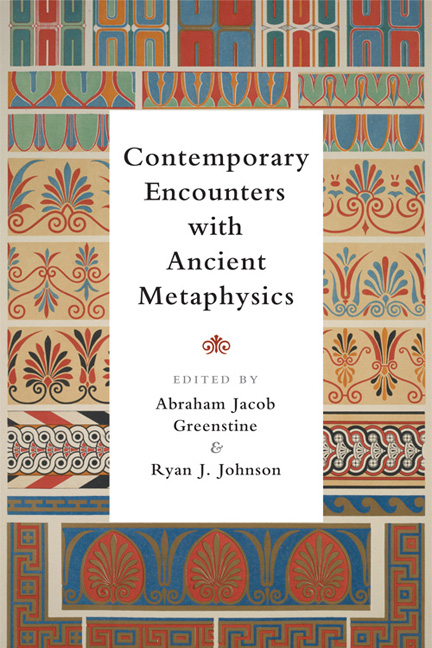Book contents
- Frontmatter
- Contents
- Acknowledgements
- Note on the Text
- Notes on Contributors
- 1 A Thousand Antiquities
- Part I Plato
- Part II Aristotle
- 7 Science Regained [1962]
- 8 Aristotle's Organism, and Ours
- 9 Does It Matter? Material Nature and Vital Heat in Aristotle's Biology
- 10 The Modern Aristotle: Michael Polanyi's Search for Truth against Nihilism
- 11 Diverging Ways: On the Trajectories of Ontology in Parmenides, Aristotle, and Deleuze
- 12 Object and Οὐσία: Harman and Aristotle on the Being of Things
- Part III Epicureans, Stoics, Skeptics, and Neo-Platonists
- Part IV Postscript
- Index
8 - Aristotle's Organism, and Ours
from Part II - Aristotle
- Frontmatter
- Contents
- Acknowledgements
- Note on the Text
- Notes on Contributors
- 1 A Thousand Antiquities
- Part I Plato
- Part II Aristotle
- 7 Science Regained [1962]
- 8 Aristotle's Organism, and Ours
- 9 Does It Matter? Material Nature and Vital Heat in Aristotle's Biology
- 10 The Modern Aristotle: Michael Polanyi's Search for Truth against Nihilism
- 11 Diverging Ways: On the Trajectories of Ontology in Parmenides, Aristotle, and Deleuze
- 12 Object and Οὐσία: Harman and Aristotle on the Being of Things
- Part III Epicureans, Stoics, Skeptics, and Neo-Platonists
- Part IV Postscript
- Index
Summary
How does an entity come to be? The production of artifacts is of course easily explained through the technical human capacity for identifying (and indeed – under capitalism – generating) needs and wants, and designing and manufacturing solutions from cooking vessels to drone weapons. But, despite the advances of systems chemistry, molecular biology, and both ecological and developmental biology, the coming to be or ontogenesis of natural entities remains fundamentally mysterious, both in the sense of the original emergence of living order from its physico-chemical environment, and in the sense of the development of an individual organism from germ cell to adult form. Arguably, it is this latter mystery that is Aristotle's own central problematic (Aristotle's universe is one that maintains itself in perpetuity and therefore questions of cosmic origins and the origin of life do not concern him). This ontogenesis has at least two registers: the metaphysical and the biological – the coming to be of beings qua their being, or the question of how a thing emerges where there was no thing before, on the one hand, and the specific biological mechanisms involved in natural coming to be, on the other. While Aristotle's metaphysics of becoming has perhaps its most programmatic account in the first books of the Physics, called by Heidegger the “hidden, and therefore never adequately studied, foundational book of Western philosophy,” the specific mechanisms of natural becoming, at least in the animal kingdom, are covered in Generation of Animals.
Technical metaphors of course abound in Aristotle's accounts of coming-tobe: we are all familiar with the bronze sphere or the statue as the paradigmatic hylomorph, the composite of matter and form as essential causes of an entity, the τόδε τι or “this something” that is the central deictic object of Aristotle's ontological investigations. To round out the roster of four essential causes, we might add the moving cause or ἀρχὴ κινήσεως, which is the craftsman himself, and the final cause or “that for the sake of which,” the purpose which the object will serve, for which it is made. Nonetheless the primary problem, the wondrous mystery that all this is marshaled to explain, is the natural organism, and it is this that forms the central locus of Aristotle's investigations, and in which the metaphor of technical production plays a pivotal part.
- Type
- Chapter
- Information
- Contemporary Encounters with Ancient Metaphysics , pp. 138 - 157Publisher: Edinburgh University PressPrint publication year: 2017



